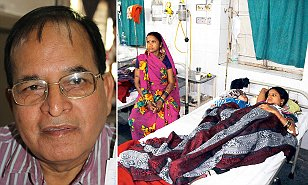 New Delhi, Nov 13: The surgeon under scanner for botched-up sterilisation surgeries in Chhattisgarh, R K Gupta, violated a Supreme Court order which allows a maximum of 30 operations in a day with two separate laparoscopes only in government facilities. Also, a doctor cannot perform more than 10 sterilisations per day.
New Delhi, Nov 13: The surgeon under scanner for botched-up sterilisation surgeries in Chhattisgarh, R K Gupta, violated a Supreme Court order which allows a maximum of 30 operations in a day with two separate laparoscopes only in government facilities. Also, a doctor cannot perform more than 10 sterilisations per day.
Despite this, Gupta performed about three times the permissible number of surgeries (83) in less than six hours in a private hospital which reportedly remained closed for 15 years. This is an evidence of how these operations were not performed as per protocol, public health activists said.
“After each procedure, a laparoscopic instrument is to be sterilised before the next use. The sterilisation process can take any time between one and two hours,” a former professor of All India Institute of Medical Sciences told Deccan Herald.
The toll touched 13 with the death of two more women, one from the protected Baiga tribe, on Wednesday.
Twenty-six more women were referred to hospitals in Bilaspur after they reported complications following the surgery. Gupta conducted three sterilisation camps at Pendra, Garola and Marwahi near Bilaspur on November 10 in which 55 women were operated.
Almost 50 per cent of them developed complications following which they were admitted to Chhattisgarh Institute of Medical Sciences, Bilaspur. Among those who underwent tubectomies were two tribal women from the Baiga community, who are not to be sterilised as per a government rule. One tribal woman, Chaiti Bai, died prompting angry reactions from state Congress leaders.
The Chhattisgarh High Court took suo motu cognisance of the incident and asked the Raman Singh government to submit a detailed report within 10 days. The division bench comprising Justice T P Sharma and Justice Inder Singh Uboweja took serious note of the reports on the incident at a government-organised sterilisation camp in Pedari village in Takhatpur block on Saturday. The bench appointed two advocates— Salim Kazia and Sunita Jain— as amicus curiae to assist the court.
While the state government constituted a three-member panel to probe the incident, doctors and public health activists suspect poorly sterilised laparoscopic instruments could be one of the key reasons behind the tragedy. Some medicines used in these camps have also been seized.
Meanwhile, the Supreme Court refused to take suo motu cognisance of the incident when some lawyers tried to attract the attention of the bench to the newspaper reports on the tragedy. The apex court, however, asked them to file a petition.





Comments
Add new comment